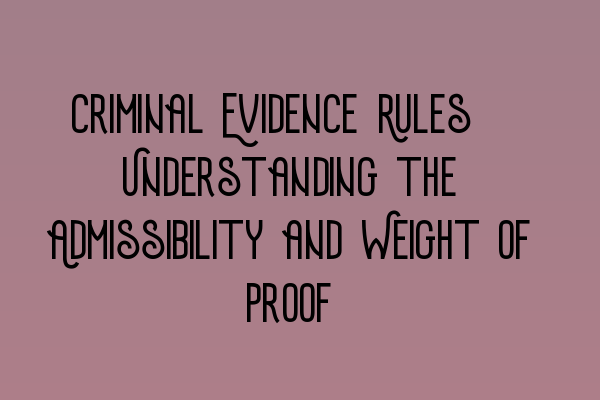Criminal Evidence Rules: Understanding the Admissibility and Weight of Proof
As criminal law practitioners, understanding the rules governing the admissibility and weight of evidence is crucial to ensuring a fair trial and achieving success for our clients. The criminal justice system in the UK places great importance on the proper assessment and evaluation of evidence, and as legal professionals, it is our responsibility to navigate these rules effectively.
In this comprehensive guide, we will dive into the principles and standards surrounding the admissibility and weight of criminal evidence. Whether you are studying for the SQE exams or seeking to enhance your understanding of this fundamental aspect of criminal law practice, this article aims to provide you with the knowledge and insights you need.
Understanding Admissibility
Admissibility refers to the legal acceptability of evidence in court. Not all evidence is admissible, and practitioners must be well-versed in the rules that govern this aspect of the trial process. The admissibility of evidence is influenced by several factors:
- The relevance of the evidence to the case
- The reliability and credibility of the evidence
- The fairness and prejudicial effect of the evidence
- The compliance with legal procedures and rules
In order to ensure admissibility, it is essential to conduct a thorough analysis of the evidence being presented and the grounds on which it is being offered. Understanding the specific rules surrounding different types of evidence, such as hearsay, confessions, or expert testimony, is vital to making effective arguments and advocating for our clients’ interests.
To effectively navigate the admissibility requirements, it is essential to keep up-to-date with the latest developments in criminal evidence law. SQE Sample Papers: Practice for Exam Success and Focus Areas in SQE1 and SQE2: Mastering Key Concepts can provide invaluable resources for honing your skills in this area.
Evaluating Weight of Proof
Once evidence is admitted at trial, it is crucial to assess its weight or probative value. Weight of proof refers to the degree of persuasiveness or strength of the evidence in establishing the truth or falsehood of a fact in dispute. Effective evaluation of the weight of proof allows us to present compelling arguments and convince the judge or jury of our client’s innocence or guilt.
When evaluating the weight of proof, it is important to consider various factors:
- The reliability and credibility of the evidence
- The consistency and coherence of the evidence with other facts
- The presence of corroborating evidence
- The probative value of conflicting evidence
By carefully assessing these factors, we can strengthen our clients’ cases and challenge the opposing party’s arguments. Developing a deep understanding of the principles governing the weight of proof is essential to achieving success in criminal trials.
For further guidance on enhancing your performance in SQE exams or improving your overall understanding of criminal evidence, resources such as Adjusting Your SQE Strategy Based on Mock Performance and SQE Mock Debrief Sessions: Critical Steps for Improvement offer valuable insights into effective strategies and techniques.
Conclusion
Mastering the rules and principles surrounding the admissibility and weight of proof is essential for criminal law practitioners. By understanding the nuances of these rules, we can effectively advocate for our clients and work towards achieving a fair and just outcome in every case.
To ensure success in the SQE exams, it is crucial to continuously engage with resources that provide practice opportunities and comprehensive knowledge. SQE Sample Papers: Practice for Exam Success and Focus Areas in SQE1 and SQE2: Mastering Key Concepts are invaluable assets for those seeking to enhance their understanding and performance.
Remember, post-mock feedback sessions, such as those discussed in Post-Mock Feedback Sessions: Improving Your Performance, can also be instrumental in identifying areas for improvement and refining your skills.
By staying updated, engaged, and knowledgeable in criminal evidence rules, we can confidently navigate the complexities of the legal system and advocate effectively for our clients.
